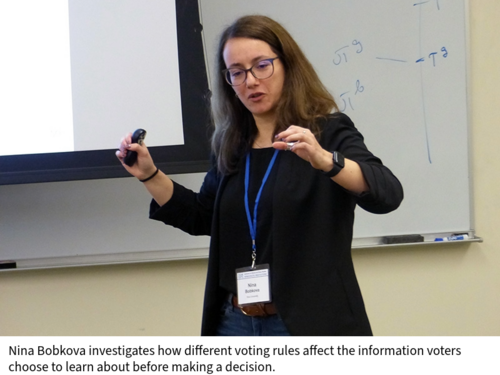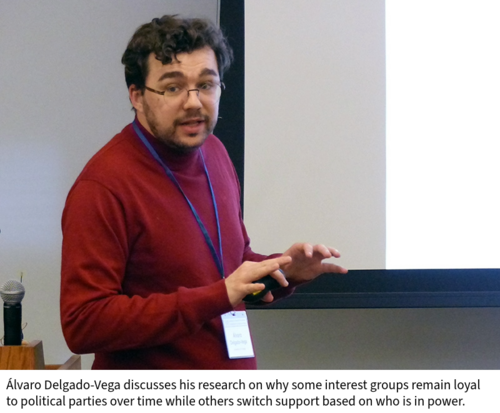How Game Theory and Political Science Are Rewriting What We Know About Democracy

In 1803, the United States paid France $15 million for the rights to 828,000 square miles of territory encompassing all or part of 15 current states in the Mississippi River’s drainage basin. Every Democratic-Republican senator aligned with President Thomas Jefferson supported what became known as The Louisiana Purchase. Every Federalist opposed it on at least one roll call vote.
Why?
Aside from the cost and questions about the constitutionality of the purchase, the Federalists feared that adding new western territories would increase the number of voters supporting Democratic-Republicans.
“The Federalists understood well that these structural changes in the voting population threatened their political survival,” Avidit Acharya, professor of political science at Stanford University, and his co-authors wrote in “How Polarization Ends,” a paper presented at a Yale conference earlier this month.
In this example, the Federalists attempted to navigate a complex, biased, and unequal information environment in which the rules of the electoral game were quickly shifting. They recognized a structural threat to their voting power and made a strategic decision. They ultimately failed to adapt, and the Federalist Party faded from national politics.
Acharya, Yale College ’06, joined fellow researchers for two days at Yale’s Institution for Social and Policy Studies (ISPS) to explore how political behavior is shaped by the interaction of beliefs, institutions, and strategic incentives. Their papers and discussions focused on environments in which information is limited, costly, or biased; political actors must make decisions burdened with uncertainty; and they must abide by rules and systems that influence who gets power and how it is used.
“It was a great privilege to engage with so many talented political economy scholars who employ game theoretic analysis to understand how information and interests combine to shape how we choose and implement policy,” said Adam Meirowitz, ISPS faculty fellow and Damon Wells Professor of Political Science. “We are learning that even when people are trying to act rationally, they often end up in echo chambers or in settings where the pressures to perpetuate polarizing forces are strong. Not because they’re irrational or naturally inclined to create divides, but because of the structures and incentives around them.”
Meirowitz organized the conference with Ian Turner, assistant professor of political science, and Danil Dmitriev, a resident postdoctoral associate, as part of ISPS’s Democratic Innovations program focused on identifying and testing new ideas to improve the quality of democratic representation and governance.
“Over these two days, we saw more clearly what people choose to learn within political systems, how institutions shape incentives and behavior, and how inequality, bias, and complexity affect democratic outcomes,” Dmitriev said. “These lessons go beyond politics. We are gaining a deeper understanding about how people make decisions in a world where information is messy, power is uneven, and the stakes are high.”
Álvaro Delgado-Vega, assistant professor at the University of Chicago Harris School of Public Policy, presented “Which Side are You On? Interest Groups and Relational Contracts,” demonstrating through a formal theoretical model why some interest groups — including private companies and labor unions — remain loyal to political parties over time while others switch their support based on who is in power.

“Opportunistic behavior only really benefits interest groups when the people in power have significant limitations to handing out special favors,” Delgado-Vega said. “It can show that there are limits built into the system.”
Nina Bobkova, assistant professor of economics at Rice University, presented “The Optimality of Majority Rule: An Information-Choice Perspective,” investigating how different voting rules affect the information voters choose to learn about before making a decision.
She found that majority rule proves optimal because it encourages voters to learn about the overall quality of a proposal, leading to better collective decisions. More extreme voting rules, requiring a higher consensus, result in voters relying more on personal preferences, leading to less informed and more divided decisions.
“The further the quota is from a simple majority, the more voters focus on their idiosyncratic preferences,” Bobkova said, explaining how voting thresholds shape what kind of information people prioritize. “This is not about how much we learn, but what we choose to learn. And that choice is shaped by the voting rule.”
Andrew Little, associate professor of political science at the University of California, Berkeley, presented “Biased Learning from Elections,” in which he and his co-authors investigate how political parties often interpret election outcomes in ways that support their beliefs, sometimes at the cost of accuracy.
Anna Wilke, assistant professor of politics at New York University, discussed her paper, “Crime, Protection, and Partisan Politics: A Model of Law Enforcement Spending,” in which she explains how different income groups, crime, and private security — not ideology alone — influence how much governments spend on policing.
Her model shows that in poorer societies, right-wing parties may spend more than socially optimal on policing because their middle-class base wants protection. In wealthier societies, right-wing parties may spend less than socially optimal on policing because their base can afford private security, while left-wing parties may spend more as their base becomes more middle class and wants more protection.
Acharya discussed how he and his co-authors built a model to analyze how previous periods of extreme political polarization in the United States has ended.
They found that when voters are evenly split, parties take opposing positions, leading to high polarization. As one party gains more support because of demographic or economic changes, it grows dominant, and the weaker party either adopts the dominant party’s positions or fades away. Eventually, new issues emerge, the dominant party splits, and a new cycle begins.
“Polarization tends to end not through compromise, but when one party becomes dominant — often due to big changes in who votes and what issues matter,” Acharya said. “However, today’s political system — including primaries and nationalized politics — may make it harder for one party to dominate or for polarization to end quickly.”
Turner presented a game-theoretic model to explore how citizens and governments work together to provide public services — such as education, sanitation, or policing — and how this cooperation affects democratic accountability. He and his co-author found that high cooperation, such as complying with public health measures, makes failures more damaging to incumbent politicians.

“Co-production can blur the lines of responsibility, sometimes making it harder for voters to know whether to reward or punish politicians,” Turner said. “In some cases, such shared responsibility can enhance accountability by giving citizens more information and involvement. The effects depend on the competitiveness of the electoral environment and community socioeconomic demographics.”
Xu Tan, associate professor of economics at the University of Washington, presented “A Rational Inattention Theory of Echo Chambers,” in which she and her co-authors explain why people end up in environments where they mostly hear opinions that match their own — even when they are trying to make smart, informed decisions.
They argue this happens not because people are irrational but because they have limited attention and must choose carefully what to focus on. Often, those are sources and people who already agree with them. In a political context, this dynamic can explain the persistence of polarization, as voters pay more attention to like-minded friends and can miss important but contradictory information.
“Echo chambers aren’t just emotional or irrational,” Tan said. “They are a logical result of limited attention in a world overflowing with information.”
Alan Gerber, ISPS director and Sterling Professor of Political Science, praised the event for striving to achieve the highest ideals of the Democratic Innovations program.
“At ISPS, we conduct empirical studies of politics but also seek to improve democratic systems by understanding their deep theoretical properties,” Gerber said. “Democratic systems have strengths and significant vulnerabilities. It is more important than ever to understand how institutions influence individual choices and how our democratic institutions can be designed to advance our collective interests.”